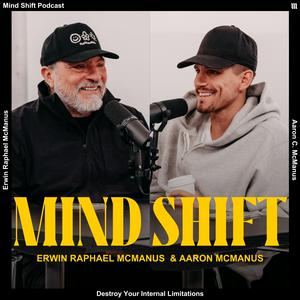#091 Heaven And Hell: Do You Know The Bible?
In this episode, Aaron McManus and his father, Erwin McManus, dive into a deeply engaging Q&A, taking on listener-submitted questions around theology, scripture, and spiritual formation. They begin by opening up the format, inviting the community into the conversation, and encouraging engagement beyond the podcast through live discussions and the Mind Shift community platform. Aaron shares the structure for the episode, giving Erwin space to unpack major theological ideas while also fielding more personal and philosophical inquiries about belief, interpretation, and spiritual leadership. Their dynamic sets the tone for an open, curious, and deeply reflective exchange of ideas.A core question raised early in the episode is whether the Bible is infallible. Erwin answers by distinguishing between the perfection of truth and the imperfection of its human messengers. He explains that though written by fallible individuals, the Bible’s intent is not deception but revelation—it is true in what it reveals about God and humanity. Drawing parallels to scientific principles, he likens scripture to the discovery of infallible truths by imperfect people. This launches a broader conversation about the purpose of the Bible—not just to know scripture, but to know God through it.As the episode deepens, Aaron and Erwin explore resources and tools for better understanding scripture. Erwin emphasizes learning in community, where questions are not only allowed but necessary for growth. He reflects on his own early study practices, which included studying Greek and Hebrew and relying on commentaries and physical books. Their discussion touches on how historical and cultural context shapes interpretation and how staying connected to the original languages can preserve nuance often lost in translation. They also reflect on the influence of decisions made at the Council of Nicaea and how certain texts were excluded from the canon.The episode also tackles big theological concepts, including the Trinity, the nature of heaven and hell, and the role of Satan in Genesis. Erwin breaks down the idea of the Trinity with metaphors and references to scripture, highlighting the relational and dynamic nature of God. When asked why Satan was allowed in the garden, Erwin suggests that love demands freedom and trust. Regarding the afterlife, he stresses that the Kingdom of God is a present reality, more pressing than abstract speculation about heaven or hell. He offers a bold view on Jesus’ descent into hell and the possibility of it being “emptied,” emphasizing grace over fear.Finally, they touch on more speculative areas like the Nephilim and the Book of Enoch, while anchoring their theological foundation in the canonical scriptures. Erwin encourages curiosity but warns against letting non-canonical texts distract from what’s central to faith. They also explore differing views on salvation and the dangers of weaponizing theology for control. Throughout, Erwin underscores the radical freedom of grace and love as the most transformative forces. The episode closes with a glimpse into Erwin’s sermon prep routine, shaped by decades of immersion in scripture, and an encouragement to approach theology not as a fixed system, but as a living conversation with God, guided by humility and wonder.

